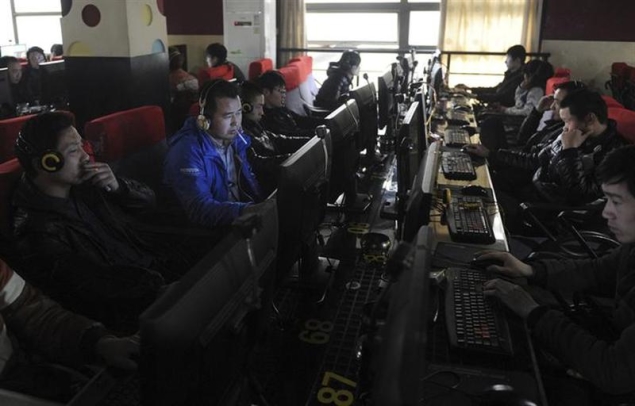- Home
- Internet
- Internet News
- China provides sanctioned website for citizens to report corruption
China provides sanctioned website for citizens to report corruption

President Xi Jinping has made fighting pervasive graft a central theme of his new administration, warning that the problem is so severe it could threaten the survival of the ruling Communist Party.
The party has been keen to harness the power of the Internet in the fight, though it has been hampered by public suspicion that complaints will be ignored, and also by arrests of and even attacks on online whistleblowers.
Speaking on a webcast on the party anti-corruption watchdog's recently unveiled website, the agency's secretary general, Cui Shaopeng, tried to set such concerns aside.
"Many internet users have said 'if I report a case then how will I be protected?' They fear that if they do report then they will be subject to revenge attacks," Cui said.
"I can tell everyone in a responsible way, all reports logged on the Central Commission for Discipline Inspection's website will receive legal protection, and we will severely deal with revenge attacks. Our attitude is very clear on this," he added.
Cui said they wanted people to provide their real names and contact details, and such reports would be given priority.
"At the same time, we hope people can submit responsible reports, not lodge false accusations and not use gossip or hearsay to report on real issues."
China set up a website in 2009 specifically for the reporting of corruption, and authorities have investigated some online accusations and jailed several low-level officials.
It is unclear how many tips the site has gotten in recent months. Between 2008 to 2012, the commission said it received 301,000 whistleblowing reports online.
"Makes no difference"
The new website is designed to act as a centre for both reporting on corruption and carrying official statements on officials being investigated.
Still, Beijing remains wary of giving people too much latitude, and does not give legal protection for whistleblowers who act outside government boundaries, by using the Twitter-like Sina Weibo service, for example.
"This is a laughable instruction," Zhu Ruifeng, one of China's most prominent whistleblowers, told Reuters when asked about Cui's comments.
"It makes no difference what they say, as they won't go after the really top corrupt officials," added Zhu, who runs a whistleblowing website called "People Supervision Net". "And I'm sure they don't have enough people to deal with all the reports coming in."
Last year, Zhu released a video of Lei Zhengfu, a district party chief in the southwestern city of Chongqing, having sex with his much younger mistress.
Communist Party officials are banned from having mistresses, and the video came to symbolise to many people the excesses of the ruling elite. Lei was sentenced in June to 13 years jail for bribery.
The government has also gone after other officials whose misdemeanours were first reported on social media sites.
On Thursday, an official in the southern city of Guangzhou was jailed for 11-1/2 years for graft after his ownership of 22 properties was exposed online, earning him the nickname "house uncle".
© Thomson Reuters 2013
Get your daily dose of tech news, reviews, and insights, in under 80 characters on Gadgets 360 Turbo. Connect with fellow tech lovers on our Forum. Follow us on X, Facebook, WhatsApp, Threads and Google News for instant updates. Catch all the action on our YouTube channel.
Related Stories
- Samsung Galaxy Unpacked 2026
- iPhone 17 Pro Max
- ChatGPT
- iOS 26
- Laptop Under 50000
- Smartwatch Under 10000
- Apple Vision Pro
- Oneplus 12
- OnePlus Nord CE 3 Lite 5G
- iPhone 13
- Xiaomi 14 Pro
- Oppo Find N3
- Tecno Spark Go (2023)
- Realme V30
- Best Phones Under 25000
- Samsung Galaxy S24 Series
- Cryptocurrency
- iQoo 12
- Samsung Galaxy S24 Ultra
- Giottus
- Samsung Galaxy Z Flip 5
- Apple 'Scary Fast'
- Housefull 5
- GoPro Hero 12 Black Review
- Invincible Season 2
- JioGlass
- HD Ready TV
- Latest Mobile Phones
- Compare Phones
- Tecno Pova Curve 2 5G
- Lava Yuva Star 3
- Honor X6d
- OPPO K14x 5G
- Samsung Galaxy F70e 5G
- iQOO 15 Ultra
- OPPO A6v 5G
- OPPO A6i+ 5G
- Asus Vivobook 16 (M1605NAQ)
- Asus Vivobook 15 (2026)
- Brave Ark 2-in-1
- Black Shark Gaming Tablet
- boAt Chrome Iris
- HMD Watch P1
- Haier H5E Series
- Acerpure Nitro Z Series 100-inch QLED TV
- Asus ROG Ally
- Nintendo Switch Lite
- Haier 1.6 Ton 5 Star Inverter Split AC (HSU19G-MZAID5BN-INV)
- Haier 1.6 Ton 5 Star Inverter Split AC (HSU19G-MZAIM5BN-INV)







![[Partner Content] OPPO Reno15 Series: AI Portrait Camera, Popout and First Compact Reno](https://www.gadgets360.com/static/mobile/images/spacer.png)









